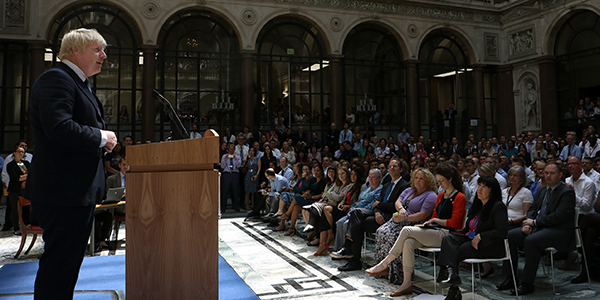What does Boris Johnson’s political record tell us about his prospects as Prime Minister?
As Conservative MPs whittle the contest to be next leader of the party – and so next Prime Minister – down to a final two who will face the party membership, Ben Worthy assesses the record of the clear frontrunner, Boris Johnson, and what his time as London Mayor and Foreign Secretary indicate about his aptitude for the top job.

Boris Johnson speaking to Foreign Office staff, 14 July 2016. Picture: Foreign and Commonwealth Office/ (CC BY 2.0) licence
‘Prime Minister Boris Johnson’: I know, as I write those words, what you have all just thought, said or shouted aloud. His performance in the five-way BBC debate filled no one with confidence. But we need to take care with our snap judgements. Many Prime Ministers were viewed very differently before their arrival in power. Churchill was seen as a reckless war-monger, and Thatcher a temporary female stop-gap. Remember too that Theresa May, and before her Gordon Brown, were to be diligent, strong, decisive leaders. Clement Attlee’s limerick about his own life says it all.
To measure leaders, we need to understand both the person and the context. To take the person of ‘Boris’ first, Johnson’s own time in high office leaves us with some pretty mixed messages as to how he would be in Number 10. As Rafael Behr points out, we have a selection of different Boris’s to choose from.
On the one hand, he is seen as a broadly successful Mayor of London, but what exactly is meant by this is quite revealing. His ‘success’ was built on him winning, as many Tory MPs keep repeating to themselves with hope, twice in a Labour city. Mayor Johnson was then Britain’s Heineken politician. One analysis of his second term concluded that ‘his approval rating has been remarkably consistent…and drastically higher than most national politicians’.
The key aim for Johnson in London was, as one biographer put it, not to fail, but it’s a little murkier judging what he actually achieved. His policies on alcohol bans on the tube and Boris Bikes were eye-catching, though promises on buses disappeared, while his plan for a new garden bridge over the Thames is still mired in controversy. He easily swatted away scrutiny, at least until he left.
For Johnson, it was about being seen doing rather than actually doing. His mayoralty can be viewed as a series of photo opportunities, epitomised when he took part in a police drugs raid in 2011, complete with TV cameras and a stab vest, when the suspect greeted his appearance with the words ‘what the xxxx are you doing here’? Johnson as Mayor was ‘long on charisma and short on detail’.
On the other hand, his time as Foreign Secretary was a failure, and he appeared short on everything. He achieved little and had his hand in a series of mistakes. This included apparently greeting a reception of ambassadors with the words ‘We have invaded, defeated or conquered most of your countries, but we are here as friends.’ Some of his mistakes would normally have been career-ending, not least over the imprisonment of Nazanin Zaghari-Ratcliffe in Iran, when Johnson’s careless language seemed instrumental in worsening her plight. In terms of Brexit he played to the gallery (and many delusions) over everything from EU payments to Ireland, and his interventions were described as ‘toxic’. On a day-to-day level he clearly struggled, and bluffed his way through serious problems, insulting religious groups and once-colonised countries with reckless abandonment as he went. The collective judgement has been that Johnson damaged Britain’s reputation, and one former ambassador called him ‘the least deserving and least qualified Foreign Secretary of modern times, who has successfully lived down to all expectations’. The greatness of the office, as Churchill once put it, found him out.
Even more concerning was how he responded to his failure and plummeting popularity. The pressure of scrutiny was much stronger, and less sympathetic. Johnson became much less liberal, and more willing to say and do unpleasant things. He somehow managed to combine the slapstick clumsiness of Charlie Chaplin with the far-right politics of Steve Bannon. The charge of Islamophobia has clearly stuck, and Johnson’s attempts to refute it seemed to make it worse rather than better.
His friends and enemies agree that being Mayor was the perfect platform for him to be popular and liked, which is a source of strength but also a great weakness. The Mayor of London required blazes of publicity as much as careful decisions, which Johnson successfully delegated. The Foreign Office, especially during Brexit, required care, attention and diplomacy away from the limelight. These are all attributes Johnson lacks. The problem for Johnson now is that being Prime Minister is much more like the Foreign Office than the Mayor’s office.
Does Johnson have any of the attributes a Prime Minister needs? He has been lucky, and any Prime Minister needs to be lucky. He has faced career death multiple times and bounced back. He was sacked from the shadow cabinet in 2004, then seemingly stuck as a shadow minister for higher education in 2007, but won against Livingstone in 2008 (a feat few believed he could do). As Mayor he was then lucky to have huge PR events such as the Olympics and Diamond Jubilee to draw London together, lucky to have Ken Livingstone to run against in 2012 and doubly fortunate to have such sympathetic media support. And as Foreign Secretary he had the fortune to be almost un-sackable as the big Brexiter in Cabinet.
He probably has the Machiavellian skills. It’s very hard to get close to Downing Street by accident. Johnson’s famous ‘two articles’ supporting Leave or Remain was a sign of a highly calculating brain, and his dog-whistles to the right are at least strategic in a Trump-style signalling way. His silence and media avoidance in the campaign leadership has worked so far – though, just like May, it leaves him vulnerable. This is not to say he has good judgement – he clearly thought he’d made the wrong call on the morning of the referendum and blew his chances in 2016 to become Prime Minister. I’m always astonished that someone who starred in Richard III and was supposedly writing a biography of Shakespeare failed to foresee he’d be stabbed in the back by those closest to him as he reached for the crown. How many Shakespeare plays has he read?
A less clear question is whether he is still a winner, another helpful skill, and the one the Tory party seems to be banking on. Johnson, his supporters keep repeating, has the popular touch. However, the Johnson of 2008 and 2012 is not the Johnson of 2016 or 2019, as this analysis shows, and his debate performance probably reinforced. In the 2017 general election campaign he was kept to certain safe parts of the country, and away from Remain areas. Recent polling shows him to be popular but hugely divisive in a way he wasn’t as Mayor: 28% of those asked think he’ll make a good Prime Minister but 54% think he’ll be bad. This is partly about Brexit, but also about the fact that the more recent Boris Johnson is the one who insults Muslim women while making friends with allies of Marine Le Pen.
Yet all this discussion of his personality and skills could be missing the point. In fact, it may all be immaterial. By far the biggest question is whether he’ll get into Downing Street with any chance of doing as he wishes.
If Prime Minister Johnson wins with his promises of no deal or radical re-negotiations of the UK’s withdrawal agreement with the EU, he’ll have to U-turn or backtrack. Johnson’s own formulation is wonderfully vague:
The way to get a better deal is to prepare with conviction for No Deal…I stress that I do not want a No Deal outcome. I do not seek it, and I do not believe that will be the result.
Whatever his hopes, he is set to be trapped between an EU who will not renegotiate and a parliament that will do its best to stop a no deal Brexit (see Tim Bale’s great piece here). Tensions are already worsening with Scotland, where there are new referendum rumblings, and the complexities of Northern Ireland and the border will stay unsolved. Meanwhile, Johnson’s answers to other policy questions read rather more like a set of optimistic tweets than powerful policy messages, and on everything from tax cuts to Heathrow he left a worrying vagueness.
Johnson will be the third Conservative Prime Minister since 2016. He faces the curse of the ‘takeover’ Prime Minister that struck Theresa May. Most Prime Ministers who take over from another leader rather than win an election have short, unhappy times in office. They mostly inherit divided parties and deep crises and get, at best, a few years in power. Names like John Major, Gordon Brown and Theresa May shouldn’t fill Johnson with confidence.
He’ll find, of course, that the level of scrutiny and questioning in Downing Street is far harder than for the Mayor, or even in the Foreign Office. It will be relentless, hostile and detailed – the very things that scare him most.
This post represents the views of the author and not those of Democratic Audit. You can read the author’s article comparing Boris and Ken as mayors here (co-written with Mark Bennister and Max Stafford) and more work on the fate of takeover Prime Ministers here and here.
About the author

Ben Worthy is Lecturer in Politics at Birkbeck College, University of London. He is the author of The Politics of Freedom of Information: How and why governments pass laws that threaten their power.





 Democratic Audit's core funding is provided by the Joseph Rowntree Charitable Trust. Additional funding is provided by the London School of Economics.
Democratic Audit's core funding is provided by the Joseph Rowntree Charitable Trust. Additional funding is provided by the London School of Economics.